Bob Woodson, civil rights pioneer and founder of the community empowerment organization The Woodson Center, told reporters Wednesday that part of what motivated him to create the center’s new curriculum 1776 Unites was Amazon’s “best seller” ranking of a book called “Communism for Kids” published by MIT Press.
But an equally important reason was his belief that efforts such as the New York Times Pulitzer Prize-winning 1619 Project were “using African-American journalists and the black experience as a bludgeon against the country,” Woodson said. “We thought the response to it should be led by African-Americans as well.”
So, Woodson along with Ian Rowe, resident fellow at the American Enterprise Institute who works on education, success, and family issues, started the 1776 Unites project to “challenge the orthodoxy of failure promulgated by the 1619 Project.”
The learning modules, while not intended to compete in “gladiatorial combat” against the much more visible New York Times project, is taking a quieter approach and simply focusing on what Woodson calls “victories that are possible” by using success stories of real black Americans as they overcame slavery, discrimination, segregation, Jim Crow, urban renewal policies, and modern movements that proclaim to speak for them.
One of the life stories the modules detail include Bridget “Biddy” Mason, who petitioned her slaveholder for her freedom and won. She ultimately became a nurse, landowner, and philanthropist who was a millionaire by the time she passed in 1891.
Recommended
Then there’s the story of Elijah McCoy, the son of fugitive slaves who held 57 U.S. patents, most having to do with steam engine lubrication, and who is the man behind the expression “The Real McCoy.”
But, Rowe notes, unlike the 1619 Project, 1776 Unites is also dedicated to looking forward and empowering children to move into their futures using the 10 principles of the Woodson Center, which include: 1.) Low-income individuals and neighborhood-based organizations should play a central role in the design and implementation of programs to address the problems of their communities; 2.) An effective approach to societal problems must be driven by the same principles that function in the market economy, recognizing the importance of competition, entrepreneurship, cost efficiency, and an expectation of return on investment; and 3.) Value-generating and faith-based initiatives are uniquely qualified to address problems of poverty that are related to behavior and life choices.
Woodson, who grew up in Philadelphia in the ‘40s and was a high school dropout before finding purpose in the military and while working at a juvenile detention center for children, knows personally the struggles of the black community. He started the Woodson Center in 1981 intent on focusing on the achievements of black Americans to empower neighborhoods toward excellence. He hopes his new curriculum – which will be offered for free not just to schools but to camps, after school programs, and, according to Rowe, “anywhere that character promotion is happening” – will remind children of the black community’s “legacy of excellence and resilience.”
“[The 1619 Project] is a very corrosive and very dangerous challenge” to the nation and her own founding principles, Woodson says. “1776 Unites is an aspirational and inspirational alternative to this diabolical message.”
Sarah Lee is a freelance writer and policy wonk living and working in Washington, DC.

























Join the conversation as a VIP Member